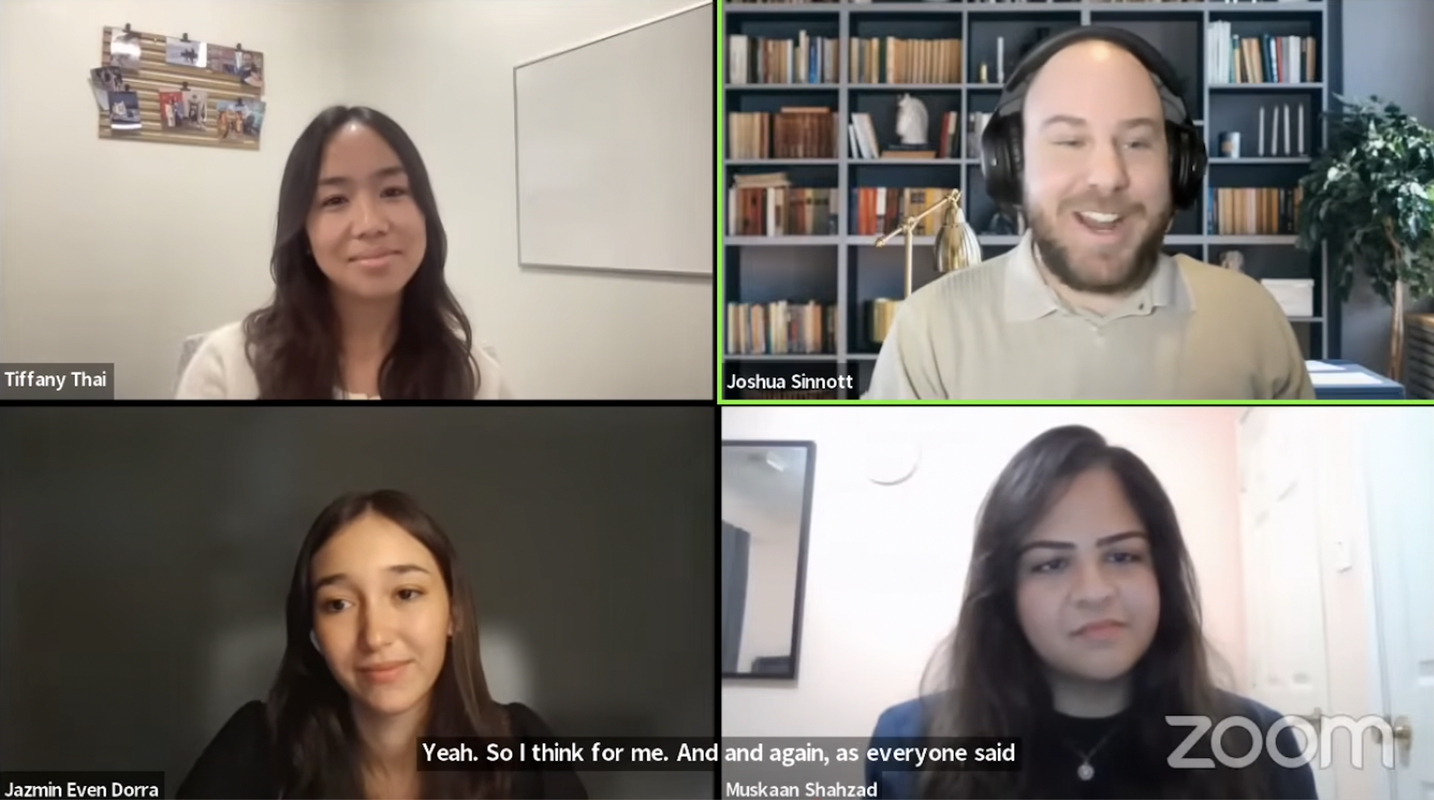What We’ve Heard About AI Education at Community Colleges
Amid federal funding cuts to community colleges and the skilled technical workforce, New America revisits the perspectives of policy experts and students on AI education at community colleges.
Blog Post

Screenshot from "AI Education at Community Colleges" Event, October 2024
July 28, 2025
This article was produced as part of New America’s Future of Work and the Innovation Economy Initiative's ongoing research on science & tech, workforce, and economic development policy and practice innovation. Share this article and your thoughts with us on Bluesky, Facebook, and LinkedIn, and subscribe to our Future of Work Bulletin newsletter to stay current on our latest research, events, and writing.
Over the past several years, New America’s Future of Work & Innovation Economy (FOWIE) Initiative has been studying what works—and what doesn’t—when it comes to emerging technology workforce development at community colleges. We have especially focused on researching capacity building, industry partnerships, and student perspectives on AI education at community colleges.
At a time when policymakers are increasingly focused on expanding AI skill attainment, as evidenced by the bipartisan NSF AI Education Act introduced in Congress by Senators Maria Cantwell (D-WA) and Jerry Morgan (R-KS), the need for this clarity is at an all-time high.
Last fall, FOWIE hosted a discussion on the state of play and policy needs for AI education and workforce development at community colleges. This May, Houston Community College graduated its first cohort of students earning a bachelor’s degree in AI. As interest in AI workforce programs grows, we are revisiting key takeaways from fall’s event. The event brought together journalists, policy experts, employers, colleges, and students to discuss the opportunities and challenges of AI education at community colleges and how policy solutions can address them.
The Fundamentals of AI Education at Community Colleges
The first panel included Antonio Delgado, Vice President for Innovation and Technology Partnerships, Miami Dade College and FOWIE Fellow; Ken Finneran, Vice President for Human Resources, eMed; Anshul Sonak, Global Director for Digital Readiness Program and Strategy, Intel; and Paul Fain, Co-Founder, Journalist at Work Shift; author of The Job newsletter.
According to an IMF report, 40 percent of jobs worldwide are exposed to AI, and few see this shift as clearly as Antonio Delgado. In his role at Miami Dade, he works directly with employers in emerging technologies. He observes firsthand how “AI is disrupting every single industry, and more people are required to have AI skills.” The rapid pace of technological change has created urgency among workers who increasingly ask him, “How can I use AI? How can I learn AI? Am I going to lose my job?” However, as Delgado pointed out, the more immediate threat may not be AI itself but someone who knows how to use it.
Many employers are looking for people with AI skills, and community colleges are stepping up as key training partners to close this skills gap. By offering accessible and flexible programs aligned with industry needs, these institutions are helping to prepare the future workforce. Companies like Intel, Dell, and Amazon have invested in AI education at community colleges to help build a pipeline of skilled talent.
Anshul Sonak leads the Intel Digital Readiness Program and stressed that AI skills shouldn’t be limited to the tech sector, noting that “the digital economy requires digital readiness for all.” This was evident in our student panel, where participants came from a wide range of fields—from psychology to the arts—underscoring the broad impact of AI.
Since 2020, Intel has partnered with over 100 schools across 39 states, providing 700 hours of AI content, faculty training, and implementation guidance. Community colleges use these resources to create AI certificates, enhance existing courses, or launch full AI associate degree programs.
At Miami Dade, Intel is a key industry partner. For Ken Finneran, Vice President for Human Resources at digital healthcare company eMed, Miami Dade’s industry-backed curriculum made the college a “unique partner that was as nimble, agile, and relevant as we needed them to be.” He added, “While we’ve implemented a number of internal initiatives, we needed external partners to help us have the expertise, education, knowledge, and skills to compete at the highest levels.”
Panelists emphasized that policymakers must ensure community colleges remain agile in designing and delivering programs—creating stackable credentials and pathways that evolve with industry demands to support career mobility. Finneran himself earned a certificate in applied AI through Miami Dade, and eMed has sent employees across departments to upskill at the college.
In addition to employer investments, support from federal agencies has helped ensure that at least one community college-level AI program exists in most states. This growing momentum includes major initiatives like the National Applied AI Consortium, an NSF grant awarded to Miami Dade College, Houston Community College, and the Maricopa County Community College District, to help community colleges build their capacity for AI education. States like California have also partnered with companies like NVIDIA to expand AI training capacity.
Despite these initiatives, panelists cautioned that funding levels have been insufficient to fully meet the nation’s workforce needs. Since the panel, that concern has only grown in light of recent federal cuts to STEM education during the Trump administration, which have hit community colleges hard. While lawmakers have signaled interest in expanding support for AI education at community colleges, panelists stressed the need for stronger coordination among federal funding, private sector efforts, and higher education institutions. This year, FOWIE co-hosted two bipartisan Capitol Hill briefings to underscore the harm of NSF budget cuts on community colleges.
Students and Workers on Community College AI Education

Screenshot from students and workers panel, October 2024
The second panel shifted focus to student voices. Last year, New America heard from the first crop of students in community college AI programs. This panel brought them back, including Jazmin Even Dorra from Miami Dade College and Muskaan Shahzad from Houston Community College, alongside Joshua Sinnott, the first graduate of the Associate’s degree in AI & Machine Learning program at Chandler Gilbert Community College.
These students initially enrolled in their programs due to limited AI opportunities at four-year institutions, but they stayed because of the quality of the affordable and employer-aligned programs. “Community colleges are faster to implement new changes, and might actually be more on the cutting edge than some of these four-year degrees,” said Joshua Sinnott.
Having already earned a bachelor’s degree, he returned to school in 2020 to enroll in one of the nation’s first associate degree programs in AI. Recognizing AI as the next major frontier in technology, he was eager to deepen his knowledge, and community college provided an affordable, early-access entry point. Sinnott credits the program’s nimbleness with giving him a competitive edge in the job market, and he now works at an AI startup.
Despite these advantages, community colleges often face misconceptions, especially in emerging tech. Jazmin Even Dorra pointed out the stigma usually associated with attending community college. “The quality is not lower—it’s the same, or sometimes even better,” she emphasized.
As heard in the first panel, employers are vetting the skills students are learning. Direct partnerships between community colleges and employers have provided students with hands-on experiences that complement their classroom learning. Students shared about unique opportunities like working at Miami Dade’s new AI center and receiving recognition at the Intel AI Global Impact Festival.
Federal and employer investments have expanded AI education at community colleges, encompassing everything from K–12 immersions to community college baccalaureate programs. However, panelists cautioned that this rapid growth brings urgent concerns, particularly around the ethics of learning and working in AI. “Things are happening so quickly with AI, and the policies are a bit behind in keeping up with all these innovations and making sure that people are safe and their information is secure,” cautioned Muskaan Shahzad.
As a current AI professional, Sinnott emphasized the importance of a strong ethics foundation and an understanding of how the technology can be misused. He noted that “even with the best of intentions, there’s still always going to be bad actors out there,” which is why safeguards must be built in from the start. While his program at Chandler Gilbert was new and had a limited focus on ethics at the time, he acknowledged that the college has since taken steps to embed ethics more fully into the curriculum.
Even Dorra expanded that AI education goes beyond learning technical skills; it involves staying informed about evolving regulations in the U.S. and globally. For instance, the U.S. Senate recently voted to strike down a proposed 10-year moratorium on state-level AI regulation. Preparing the next generation of the AI workforce means ensuring education keeps pace with such changes.
Looking Ahead to the Future of Work
AI is transforming industries and reshaping the workforce, and community colleges have responded by launching accessible, agile AI education and workforce development programs. Both panels emphasized the importance of collaboration among business leaders, policymakers, and institutions in maintaining the quality and relevance of these offerings, as well as the crucial role of federal policy and investments in making that possible.
Since the panel, Houston Community College reached another major milestone: graduating the inaugural class from its baccalaureate AI program, including Muskaan Shahzad, who not only earned her degree in AI and robotics but also delivered the college’s commencement address. Students like Muskaan will make up the future of the workforce, and community colleges are uniquely positioned to prepare them.